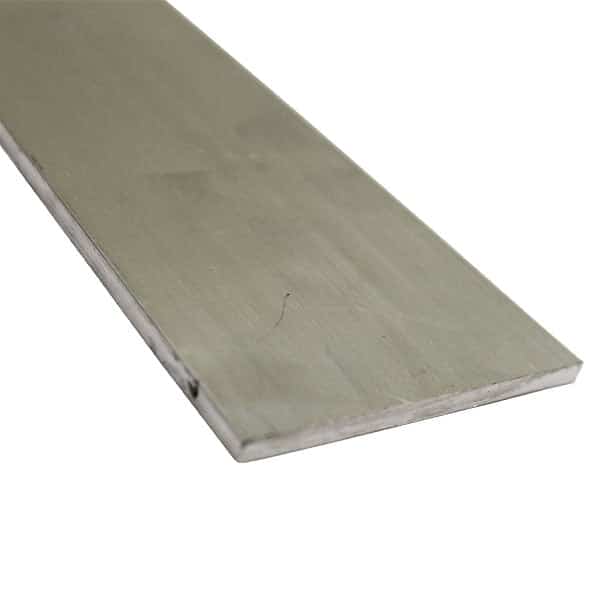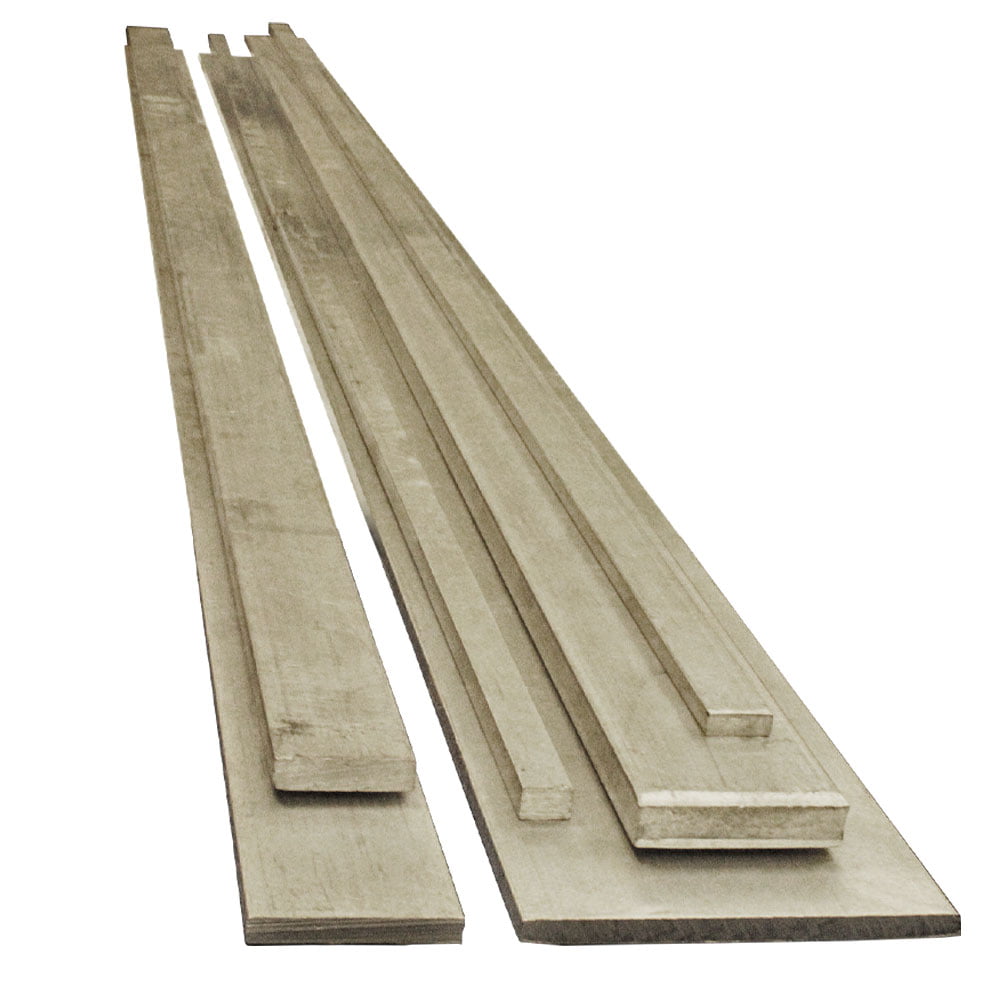- Massive Range
- FREE UK Delivery
- Rapid Dispatch
- Massive Range
- FREE UK Delivery
- Rapid Dispatch
- Massive Range
- FREE UK Delivery
- Rapid Dispatch
Menu
£6.04 – £17.60 inc VAT

Looking for the perfect flatbar to complete your next project? Look no further than the 76.2mm Width x 4.76mm Thick Aluminium Flatbar Metal Strip by Speciality Metals. This UK supply provides various lengths of a durable, corrosion-resistant metal that can withstand weather, chemicals and heat with ease. As an added bonus, this flatbar is also a great conductor of heat and electricity, making it perfect for a wide range of applications. Plus, the hygienic properties, lightweight and flexible nature of this strip make it a top choice for many different industries. And let’s not forget that it’s also recyclable, making it an environmentally-friendly choice for your next project. Stock up on this top-quality flatbar today!
We offer a wide selection of aluminium flatbar strip online from trusted mills in the UK. Providing high-quality, low-priced aluminium flat strip products to UK businesses and the general public, Speciality Metals is a leading aluminium metals supplier.
When it comes to flatbar metal strips, Speciality Metals’ 76.2mm Width x 4.76mm Thick Aluminium Flatbar Metal Strip is a top choice for many industries. This UK supplier offers various lengths of the durable and corrosion-resistant aluminum strip, making it a versatile option for a wide range of applications. The material’s resistance to weather, chemicals and heat, coupled with its good conductor of heat and electricity, make it an ideal choice for both indoor and outdoor use. Additionally, its hygienic properties, lightweight design and flexibility make it a favorite in the food and medical industries. What’s more, aluminum is a highly recyclable material which not only improves sustainability efforts but also reduces material costs. Overall, this flatbar metal strip from Speciality Metals is a reliable and high-quality option for those in need of a versatile and durable aluminum strip.
Over 50,000 customers of Specialty Metals are provided with fast, friendly customer service every year. We’re the place to try when you need metal of any shape and size. We’re based in Warrington, UK. We pride ourselves on our rapid turnaround and a large range of options.
Key product details:
Flat bar strip is also available in mild steel and stainless steel.
Speciality Metals are the best suppliers for you because:
Welding: Welding is a widely used method to join aluminium flat bars. TIG (Tungsten Inert Gas) welding is commonly preferred for aluminium due to its precision and control over heat input. MIG (Metal Inert Gas) welding can also be used. Proper cleaning, suitable filler material and expertise are essential for successful aluminium welding.
Brazing: Brazing involves using a filler material with a lower melting point than aluminium to join the flat bars. It’s less intense than welding and suitable for applications where high temperatures might distort the metal.
Mechanical Fasteners: Bolts, screws and rivets can be used to fasten aluminium flat bars together. Use corrosion-resistant fasteners and consider using washers to distribute the load and prevent damage to the aluminium.
Adhesives: High-strength adhesives designed for metal bonding can also be used to join aluminium flat bars. Surface preparation and adhesive selection are critical for ensuring a strong bond.
Interlocking Joints: Creating interlocking joints, such as lap joints or dovetail joints, can provide mechanical strength without the need for welding or fasteners. These joints can be effective for certain applications.
Cleats and Brackets: Using additional metal pieces, such as cleats or brackets, can help reinforce joints between aluminium flat bars. These additional pieces can be bolted, welded, or fastened to the flat bars.
Corner Braces: Corner braces can be used to connect aluminium flat bars at right angles. They are typically bolted or screwed into place.
Tongue and Groove: Creating tongue and groove joints can provide stability and alignment for joining aluminium flat bars.
Dust Off the Surface: Begin by removing any loose dirt or dust from the flatbar using a soft brush or cloth.
Prepare a Mild Cleaning Solution: Mix a few drops of mild dishwashing detergent in a bucket of warm water. Ensure the detergent is mild and free from abrasive components.
Soft Cloth or Sponge: Dip a soft cloth or sponge into the cleaning solution and wring out the excess water. It’s essential to use a non-abrasive cloth or sponge to prevent scratching the aluminum.
Gentle Cleaning: Wipe the aluminum flatbar gently with the damp cloth or sponge. Rub in a back-and-forth motion rather than a circular one to minimise noticeable streaks or scratches.
Stubborn Stains: For tougher stains or spots, you can use a mixture of equal parts water and white vinegar. Apply this solution to the stain and gently rub with a soft cloth.
Rinse Thoroughly: Use clean water to rinse off any detergent or cleaning solution residue. This step is crucial, as any leftover detergent can leave a film on the aluminum, causing it to look dull.
Dry Completely: After rinsing, dry the flatbar completely with a clean, soft towel to prevent water spots.
Optional – Aluminum Polish: If you want to give the flatbar a shine, you can apply a commercial aluminum polish. Always follow the manufacturer’s instructions and use a soft cloth to apply and buff.
Protective Measures: If your aluminum flatbar is exposed to harsh environments or chemicals, consider using a clear protective coating. This will help maintain its appearance and prevent corrosion.
Important Notes:
Aluminum flatbars, like other aluminum products, have a natural corrosion resistance, especially when compared to metals like steel. However, their resistance to saltwater depends on factors such as the specific aluminum alloy used, the presence of a protective oxide layer, potential galvanic corrosion when in contact with noble metals and specific environmental conditions. For instance, 5000 and 6000 series aluminum alloys are better suited for marine applications due to their superior saltwater resistance, whereas 2000 and 7000 series alloys may be more susceptible. The protective oxide layer on aluminum, which can be enhanced through processes like anodising, offers added protection. Yet, when aluminum comes into contact with metals like copper in saltwater, galvanic corrosion may ensue. Additionally, the corrosion rate can vary with saltwater temperature, oxygen content and flow rate. So, while aluminum flatbars can be a good choice for marine environments, especially when using marine-grade alloys, it’s essential to factor in alloy selection, protective treatments and regular maintenance for optimal longevity.
Check out our blogs discussing stainless steel metal strip and mild steel flat bar. It will prove a useful read to help you to make an informed decision on which material would work best for you.
We are also very proud of our ever expanding YouTube channel.
Our goal for our blogs, videos and help guides is to answer as many questions as possible to help to explain the possibilities of mesh to our customers. Contact us today if you have any questions at all. We are always really keen to help in any way that we can.
We are also very proud of our highly popular eBay store, check us out there too.
Thank you for checking out our product.
£6.04 – £17.60 inc VAT
£5.42 – £15.56 inc VAT

£6.04 – £17.60 inc VAT

£5.42 – £15.56 inc VAT
Speciality Metals
Unit 1, Farrell Street, Warrington,
Cheshire, WA1 2WW, United Kingdom
Quick Links
Payment Options
